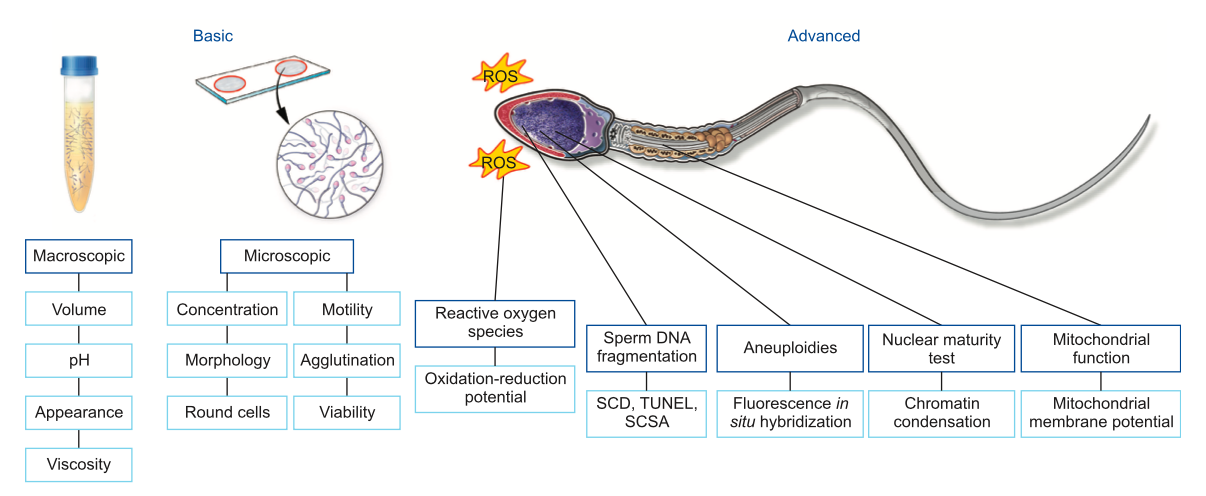What are the Latest Techniques in Male Infertility Diagnosis
The goal of investigations is to effectively narrow down the cause of male infertility and lay down the groundwork for an informed decision. Experts suggest the careful recording of past medical history and a thorough physical examination (general, abdominal, and genital examination; digital rectal examination in selected cases).
Scientists recommend diagnostic testing based on infertility causes: pre-testicular infertility that stems from a dysfunction of the pituitary gland or hypothalamus located in the brain; testicular infertility that is directly related to a chromosomal or non-chromosomal abnormality of the testicles; and post-testicular infertility that occurs from a range of other underlying factors.

Conventional and Advanced Semen Tests
General semen analysis detects physical characteristics of semen: volume, appearance, viscosity, and pH. Microscopic semen examination provides greater detail on sperm parameters: morphology, motility, viability, agglutination, and concentration. However, these tests are less accurate. On the other hand, advanced infertility tests assess precise aspects of sperm function:
- Oxidative stress is the abnormal count of reactive oxygen molecules that form when the body is low on antioxidants. Oxidative stress reduces sperm motility and damages the DNA of the sperm nucleus and mitochondria. The most common technique to measure oxidative stress is chemiluminescence assay, preferred for its high speed and sensitivity. However, it only gives accurate results with pure reagents (substances that measure a reaction).
- Sperm DNA Fragmentation (SDF) refers to damage to sperm DNA from oxidative stress or impaired action of enzymes. SDF increases the risk of delayed conception, embryo development, and miscarriage. SDF is tested using molecular techniques: TUNEL (measures enzyme activity), SCSA (tests DNA splitting), SCD (quantifies DNA dispersion), and SCGE-comet assay (assesses DNA fragments).
TUNEL is sensitive and reliable but not adequately standardized. SCSA is highly standardised and reliable, with only authorised labs allowed to carry out the test, and is marginally more expensive than the other methods. SCD is simple but is operator dependant and subjective and not standardised. Finally, comet assay is highly sensitive and reproducible but gives variable results.
- Aneuploidy or abnormal chromosome count affects different stages from pregnancy through childbirth. It leads to a reduced likelihood of pregnancy and abnormal development of the embryo or newborn. The condition is assessed by labeling susceptible chromosomes using a biotechnology technique called fluorescent in situ hybridization (FISH). FISH allows simultaneous analysis of several genes, but it is expensive and not available commercially.
- Nuclear maturity indicates abnormalities in packing of DNA-protein complex into dense chromosomes that damages DNA and reduces chances of successful fertilization due to reduced motility and abnormal morphology. Testing chromatin condensation is a popular way to determine nuclear maturity. An important benefit of the test is its ability to predict IVF outcomes.
- Mitochondrial membrane potential (MMP) is a condition of impaired energy generation that adversely affects capacitation and maturation of sperm, leading to impaired sperm motility. An effective technique to test MMP is laser scanning microscopy.
- Advancements in metabolomics, genomics, and proteomics will help uncover novel biomarkers to diagnose sperm infertility.
Imaging, Genetic, and Hormonal tests for Male Infertility
In addition to sperm-specific testing, doctors may choose to study the reproductive system and associated hormones that define the cause of infertility in males:
- Imaging approaches include (1) Ultrasound scan of the scrotum to find the presence of varicocele or structural abnormalities in and around the testicles and (2) transrectal ultrasound to assess blockages of the prostate, seminal vesicles, and ejaculatory ducts.
- Testicular biopsies assess tissue samples to find solutions to abnormal sperm production or blockages in sperm transport.
- Genetic tests confirm if the cause of infertility is inherited or if the characteristics of the Y chromosome is clinically significant.Genetic factors of male infertility are tested by Karyotyping (testing for an extra X chromosome by blood test), deletions in the Y chromosome, or other genetic mutations (deletion, insertion, or substitution in DNA).
- Hormonal tests ascertain the level of testosterone and other hormones produced by the hypothalamus or pituitary gland to confirm if the cause of infertility is hormone-mediated.
In conclusion, male infertility requires highly specialized expertise of biotechnology and clinical professionals to diagnose the precise cause of male infertility. The development of novel paradigms in this area will improve the potential of fertilization.
